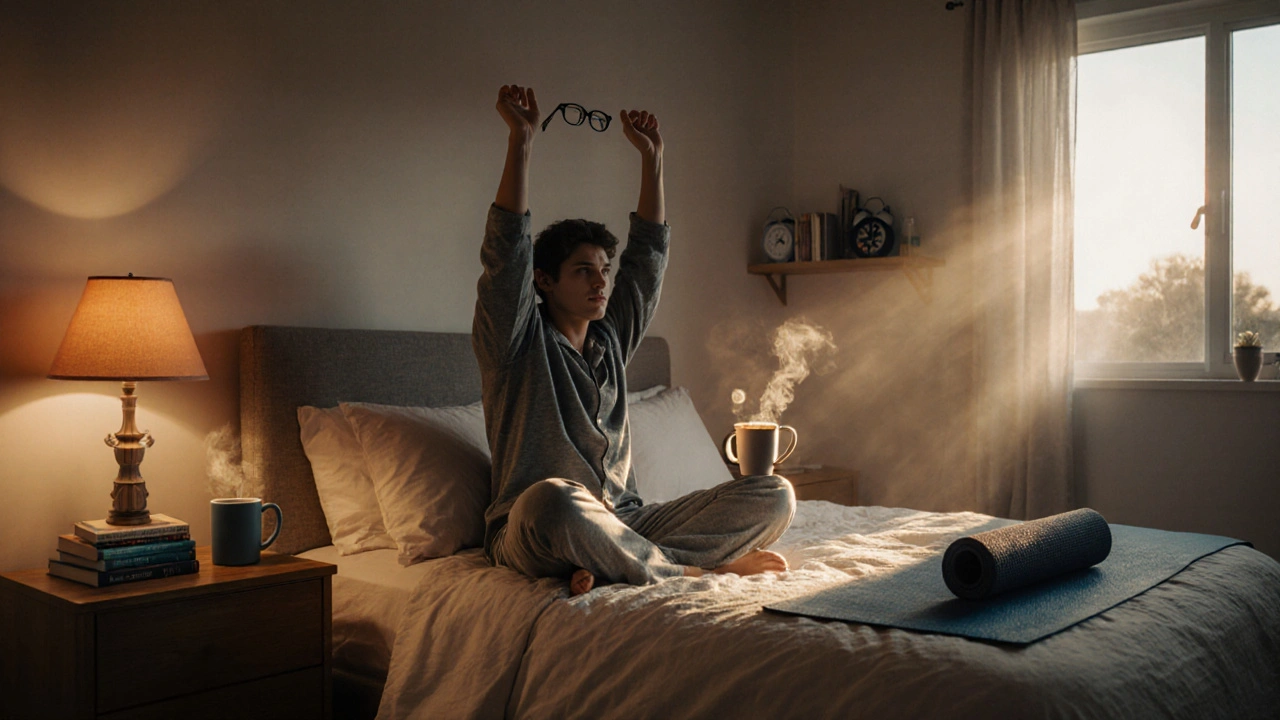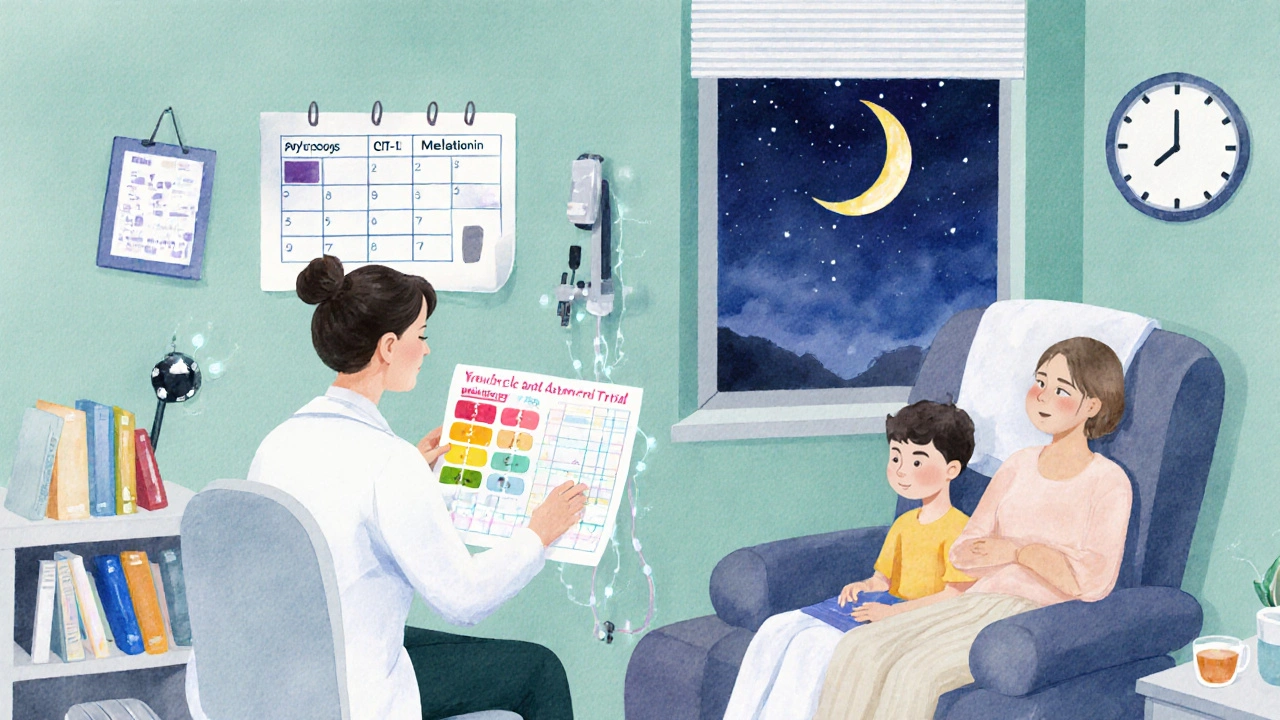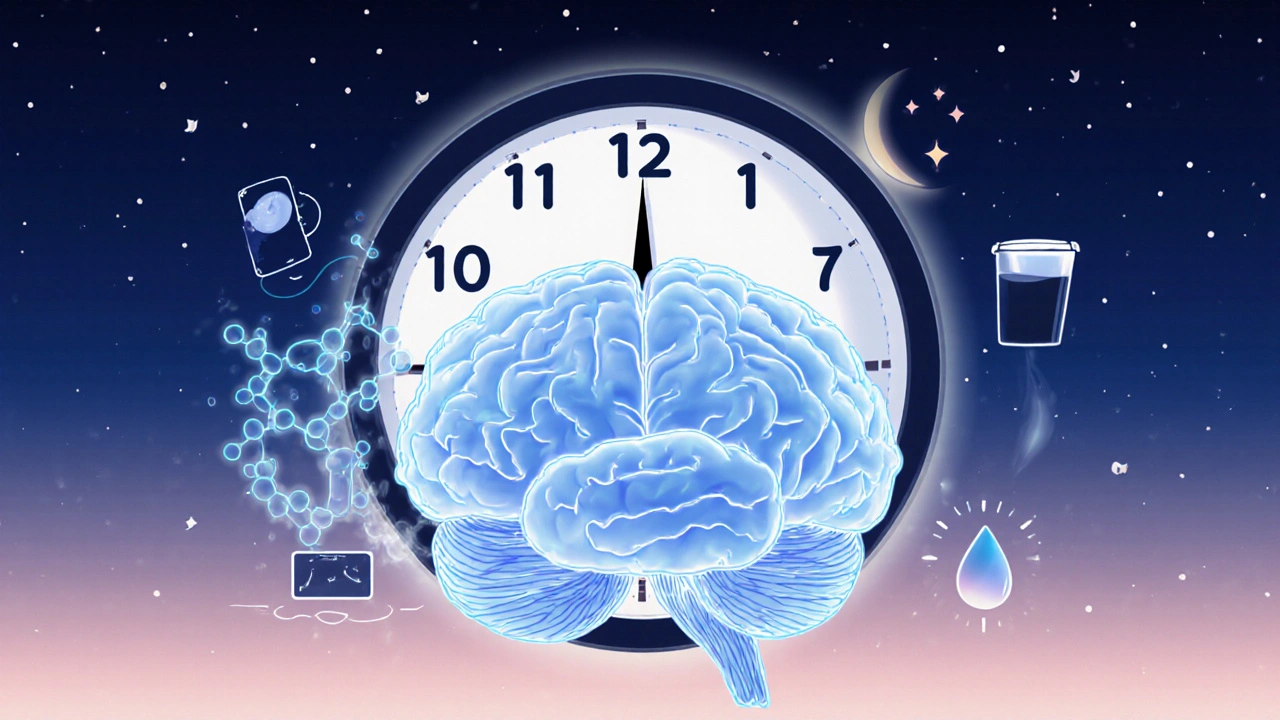ADHD & Sleep Problem Checker
This tool helps identify possible connections between ADHD symptoms and sleep issues. Answer the following questions based on your recent experiences.
Your Assessment Results
Key Takeaways
- People with ADHD and sleep problems often struggle with delayed sleep phase, fragmented sleep, and daytime fatigue.
- Neurochemical imbalances (dopamine, norepinephrine) and irregular circadian rhythms are the main biological drivers.
- Behavioral habits, medication timing, and co‑occurring conditions like anxiety amplify sleep disruption.
- Simple sleep‑hygiene tweaks, light‑therapy, and, when needed, medication adjustments can dramatically improve rest.
- If problems persist beyond a few weeks, professional evaluation for sleep apnea, restless‑leg syndrome, or CBT‑I is advised.
What Exactly Is ADHD?
ADHD is a neurodevelopmental disorder characterized by inattentiveness, hyperactivity, and impulsivity. It affects roughly 5‑7% of children and up to 3% of adults worldwide. While the hallmark symptoms revolve around attention and activity levels, the condition also reaches deep into the body’s sleep‑regulation system.
Understanding sleep problems
Sleep problems are issues that disrupt the quantity or quality of nighttime rest. Common forms include difficulty falling asleep, frequent awakenings, early‑morning wake‑ups, and non‑restorative sleep. For people with ADHD, these disturbances aren’t random-they’re linked to how the brain processes dopamine, melatonin, and circadian cues.

Why Sleep Is Frequently Disturbed in ADHD
Neurochemical Factors
ADHD brains often show lower levels of dopamine and norepinephrine. Both neurotransmitters help keep the internal clock stable. When they’re out of balance, the body’s natural drive to feel sleepy at night weakens, leading to a delayed sleep phase.
The Role of melatonin
Melatonin is the hormone that signals nightfall. Studies in 2023 found that children with ADHD often produce melatonin later than their peers-up to two hours later. The delay pushes bedtime back, shrinking total sleep time.
Circadian Rhythm Misalignment
The circadian rhythm is the 24‑hour internal clock that governs sleep, hormone release, and body temperature. In ADHD, the rhythm can run on a “night owl” schedule, making mornings especially hard.
Behavioral and Environmental Triggers
Impulsivity leads many with ADHD to indulge in late‑night screen time, caffeine, or high‑stimulus activities. These habits suppress melatonin and keep the brain aroused when it should be winding down.
Co‑Occurring Conditions
Anxiety, depression, and sensory processing issues frequently accompany ADHD. Each adds its own layer of sleep disruption-racing thoughts, altered breathing patterns, or heightened startle responses.
Common Sleep Issues Seen in ADHD
| Sleep Issue | ADHD Prevalence | Typical Causes in ADHD | Usual Management |
|---|---|---|---|
| Delayed Sleep Phase | ~40% | Late melatonin rise, dopamine deficit | Light‑therapy, melatonin supplement, bedtime routine |
| Insomnia (difficulty staying asleep) | ~35% | Hyperarousal, stimulant medication timing | CBT‑I, adjust medication schedule, screen curfew |
| Restless‑Leg Syndrome | ~15% | Iron deficiency, dopamine dysregulation | Iron supplementation, leg‑stretching, low‑dose gabapentin |
| Sleep Apnea | ~10% | Higher BMI, low muscle tone in airway | CPAP therapy, weight management, ENT evaluation |
Spotting the Red Flags
- Consistently waking up more than an hour before the desired time.
- Feeling groggy or irritable despite spending >7 hours in bed.
- Daytime naps that exceed 30 minutes and interfere with nighttime sleep.
- Frequent nighttime awakenings with no clear reason.
- Worsening of ADHD symptoms (inattention, mood swings) during the day.
If you notice two or more of these signs for more than a month, it’s time to dig deeper.

Practical Steps to Improve Sleep Quality
1. Build a Consistent Bedtime Routine
Start dimming lights 30‑45 minutes before bed, turn off screens, and choose a calming activity-reading, gentle stretching, or a warm shower. Consistency trains the circadian rhythm to expect sleep at a set hour.
2. Manage Light Exposure
Morning sunlight (10‑15 minutes) resets the internal clock. In the evening, use blue‑light‑blocking glasses or apps, and keep bedroom lighting amber or red.
3. Review Medication Timing
Stimulant meds (e.g., methylphenidate, amphetamines) can linger into the night if taken too late. Talk to a prescriber about an early‑day dose or a shorter‑acting formulation. Non‑stimulants like atomoxetine often have less impact on sleep.
4. Consider Melatonin Supplementation
Low‑dose melatonin (0.5‑3mg) taken 30‑60 minutes before bedtime can shift the sleep window earlier. Start low, monitor effect, and keep use under 3 months unless a clinician advises otherwise.
5. Integrate Physical Activity
Regular aerobic exercise-30 minutes of brisk walking, cycling, or swimming-boosts dopamine and helps regulate sleep pressure. Aim for morning or early‑afternoon sessions; vigorous late‑night workouts may be counter‑productive.
6. Try Cognitive Behavioral Therapy for Insomnia (CBT‑I)
CBT‑I targets the thoughts and behaviours that keep you awake. A typical 6‑week program includes sleep restriction, stimulus control, and relaxation training. It works especially well for ADHD‑related insomnia because it also builds executive‑function skills.
7. Address Co‑occurring Conditions
If anxiety or depression is present, standard treatments-therapy, SSRIs, or lifestyle changes-can indirectly improve sleep. Treating restless‑leg syndrome with iron or gabapentin also reduces nighttime awakenings.
When Professional Help Is Needed
Sleep labs can run polysomnography to rule out sleep apnea or periodic limb movement disorder. A qualified sleep‑medicine specialist can also prescribe short‑term hypnotics or adjust ADHD meds to a schedule that respects nighttime rest.
For children, school counselors can coordinate with parents to align homework time, after‑school activities, and bedtime, ensuring the child isn’t overstimulated before sleep.
Putting It All Together
The link between ADHD and sleep problems isn’t a mystery-it’s a mix of neurochemistry, habits, and often, co‑existing health issues. By tackling each piece-light exposure, medication timing, bedtime rituals, and underlying conditions-you can shift the balance back toward restorative sleep.
Remember, small tweaks can add up. Turning off that phone at 9p.m., walking in morning sun, and sharing medication concerns with a doctor may feel simple, but they often produce the biggest gains in energy, focus, and mood.
Frequently Asked Questions
Why do stimulant meds affect my sleep?
Stimulants increase dopamine and norepinephrine, which raise alertness. If the dose peaks in the evening, the brain stays ‘on’ and melatonin release gets delayed, making it hard to fall asleep.
Can melatonin cure ADHD-related insomnia?
Melatonin can shift bedtime earlier, but it doesn’t treat the ADHD itself. It works best when paired with good sleep hygiene and, if needed, medication timing adjustments.
Is there a link between ADHD and sleep apnea?
People with ADHD have a slightly higher risk of sleep apnea, often due to higher body‑mass index or low muscle tone around the airway. A sleep study can confirm the diagnosis.
How long does CBT‑I take to show results?
Most adults notice improvement after 3‑4 sessions, with full benefits around 6‑8 weeks. Consistency with homework assignments is key.
Should I avoid caffeine altogether?
Caffeine can worsen sleep onset, especially after 2pm. If you’re sensitive, switch to caffeine‑free drinks in the afternoon and monitor how it affects your bedtime.

